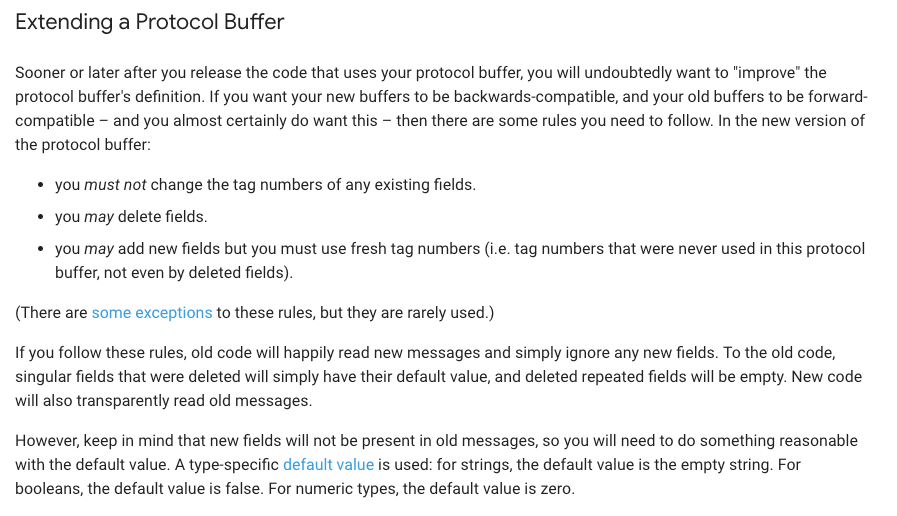Protocol Buffers学习教程
最近看公司代码的过程中,看到了很多proto后缀的文件,这是个啥玩意?问了大佬,原来这是Protocol Buffers!
这玩意是干啥的?查完资料才知道,又是谷歌大佬推的开源组件,这玩意完全可以取代XML和JSON的数据交换格式,而且更加快!
Protocol Buffer 即 PB 是大 Google 公司推行的一套混合语言数据标准, 标准介绍如下:
是 Google 开源的一种轻便高效的结构化数据存储格式,可以用于结构化数据的串行化,也称作序列化,主要用于数据存储或是 RPC 数据交换,支持多语言,可拓展. 它很适合做数据存储或 RPC 数据交换格式. 可用于通讯协议、数据存储等领域的语言无关、平台无关、可扩展的序列化结构数据格式。
感觉是不是比较抽象?
简单而言, 它的出现就是想打败 xml & json, pb 其实和他俩差不多。
既然是 Google 推行的, 肯定是采用开源策略, 附上 github 地址 (目前 star 超过 2W)
PB 首页地址
优点
◇性能好 / 效率高
◇代码生成机制 – 这个后面说
◇支持 “向后兼容” 和 “向前兼容”
◇支持多种编程语言
缺点
◇二进制格式导致可读性差
为了提高性能,protobuf 采用了二进制格式进行编码。这直接导致了可读性差的问题(严格地说,是没有可读性)
◇缺乏自描述
一般来说,XML 是自描述的,而 protobuf 格式则不是。给你一段二进制格式的协议内容,如果不配合相应的 proto 文件,那简直就像天书一般。
参考下面这篇文章安装:
mac 安装 protocol buffer(2.6.1 版) 教程
先看一下简介:
https://developers.google.cn/protocol-buffers/docs/overview
直接上手:
https://developers.google.cn/protocol-buffers/docs/tutorials
我最近在学Go,这里就用Go了,你只需要选择自己感兴趣的语言即可。
首先看一下我的项目目录:

在$GOPATH/src/github.com/chenchi/procotolbuffers/这个目录。
开始我写一个addressbook.proto的文件,具体里面的字段啥含义,直接看上面的文档,虽然是英文,很容易理解。
syntax = "proto3";
package procotolbuffers; import "google/protobuf/timestamp.proto"; message Person {
string name = ;
int32 id = ; // Unique ID number for this person.
string email = ; enum PhoneType {
MOBILE = ;
HOME = ;
WORK = ;
} message PhoneNumber {
string number = ;
PhoneType type = ;
} repeated PhoneNumber phones = ; google.protobuf.Timestamp last_updated = ;
} // Our address book file is just one of these.
message AddressBook {
repeated Person people = ;
}
接着执行:
go get -u github.com/golang/protobuf/protoc-gen-go
protoc -I=$SRC_DIR --go_out=$DST_DIR $SRC_DIR/addressbook.proto
我打算跟addressbook.proto生成在同一目录下,所以我就写当前目录了,即
protoc -I=. --go_out=. ./addressbook.proto
生成完了就是那个addressbook.pb.go文件,这里面很多东西:
// Code generated by protoc-gen-go. DO NOT EDIT.
// source: addressbook.proto package procotolbuffers import (
fmt "fmt"
proto "github.com/golang/protobuf/proto"
timestamp "github.com/golang/protobuf/ptypes/timestamp"
math "math"
) // Reference imports to suppress errors if they are not otherwise used.
var _ = proto.Marshal
var _ = fmt.Errorf
var _ = math.Inf // This is a compile-time assertion to ensure that this generated file
// is compatible with the proto package it is being compiled against.
// A compilation error at this line likely means your copy of the
// proto package needs to be updated.
const _ = proto.ProtoPackageIsVersion3 // please upgrade the proto package type Person_PhoneType int32 const (
Person_MOBILE Person_PhoneType =
Person_HOME Person_PhoneType =
Person_WORK Person_PhoneType =
) var Person_PhoneType_name = map[int32]string{
: "MOBILE",
: "HOME",
: "WORK",
} var Person_PhoneType_value = map[string]int32{
"MOBILE": ,
"HOME": ,
"WORK": ,
} func (x Person_PhoneType) String() string {
return proto.EnumName(Person_PhoneType_name, int32(x))
} func (Person_PhoneType) EnumDescriptor() ([]byte, []int) {
return fileDescriptor_1eb1a68c9dd6d429, []int{, }
} type Person struct {
Name string `protobuf:"bytes,1,opt,name=name,proto3" json:"name,omitempty"`
Id int32 `protobuf:"varint,2,opt,name=id,proto3" json:"id,omitempty"`
Email string `protobuf:"bytes,3,opt,name=email,proto3" json:"email,omitempty"`
Phones []*Person_PhoneNumber `protobuf:"bytes,4,rep,name=phones,proto3" json:"phones,omitempty"`
LastUpdated *timestamp.Timestamp `protobuf:"bytes,5,opt,name=last_updated,json=lastUpdated,proto3" json:"last_updated,omitempty"`
XXX_NoUnkeyedLiteral struct{} `json:"-"`
XXX_unrecognized []byte `json:"-"`
XXX_sizecache int32 `json:"-"`
} func (m *Person) Reset() { *m = Person{} }
func (m *Person) String() string { return proto.CompactTextString(m) }
func (*Person) ProtoMessage() {}
func (*Person) Descriptor() ([]byte, []int) {
return fileDescriptor_1eb1a68c9dd6d429, []int{}
} func (m *Person) XXX_Unmarshal(b []byte) error {
return xxx_messageInfo_Person.Unmarshal(m, b)
}
func (m *Person) XXX_Marshal(b []byte, deterministic bool) ([]byte, error) {
return xxx_messageInfo_Person.Marshal(b, m, deterministic)
}
func (m *Person) XXX_Merge(src proto.Message) {
xxx_messageInfo_Person.Merge(m, src)
}
func (m *Person) XXX_Size() int {
return xxx_messageInfo_Person.Size(m)
}
func (m *Person) XXX_DiscardUnknown() {
xxx_messageInfo_Person.DiscardUnknown(m)
} var xxx_messageInfo_Person proto.InternalMessageInfo func (m *Person) GetName() string {
if m != nil {
return m.Name
}
return ""
} func (m *Person) GetId() int32 {
if m != nil {
return m.Id
}
return
} func (m *Person) GetEmail() string {
if m != nil {
return m.Email
}
return ""
} func (m *Person) GetPhones() []*Person_PhoneNumber {
if m != nil {
return m.Phones
}
return nil
} func (m *Person) GetLastUpdated() *timestamp.Timestamp {
if m != nil {
return m.LastUpdated
}
return nil
} type Person_PhoneNumber struct {
Number string `protobuf:"bytes,1,opt,name=number,proto3" json:"number,omitempty"`
Type Person_PhoneType `protobuf:"varint,2,opt,name=type,proto3,enum=procotolbuffers.Person_PhoneType" json:"type,omitempty"`
XXX_NoUnkeyedLiteral struct{} `json:"-"`
XXX_unrecognized []byte `json:"-"`
XXX_sizecache int32 `json:"-"`
} func (m *Person_PhoneNumber) Reset() { *m = Person_PhoneNumber{} }
func (m *Person_PhoneNumber) String() string { return proto.CompactTextString(m) }
func (*Person_PhoneNumber) ProtoMessage() {}
func (*Person_PhoneNumber) Descriptor() ([]byte, []int) {
return fileDescriptor_1eb1a68c9dd6d429, []int{, }
} func (m *Person_PhoneNumber) XXX_Unmarshal(b []byte) error {
return xxx_messageInfo_Person_PhoneNumber.Unmarshal(m, b)
}
func (m *Person_PhoneNumber) XXX_Marshal(b []byte, deterministic bool) ([]byte, error) {
return xxx_messageInfo_Person_PhoneNumber.Marshal(b, m, deterministic)
}
func (m *Person_PhoneNumber) XXX_Merge(src proto.Message) {
xxx_messageInfo_Person_PhoneNumber.Merge(m, src)
}
func (m *Person_PhoneNumber) XXX_Size() int {
return xxx_messageInfo_Person_PhoneNumber.Size(m)
}
func (m *Person_PhoneNumber) XXX_DiscardUnknown() {
xxx_messageInfo_Person_PhoneNumber.DiscardUnknown(m)
} var xxx_messageInfo_Person_PhoneNumber proto.InternalMessageInfo func (m *Person_PhoneNumber) GetNumber() string {
if m != nil {
return m.Number
}
return ""
} func (m *Person_PhoneNumber) GetType() Person_PhoneType {
if m != nil {
return m.Type
}
return Person_MOBILE
} // Our address book file is just one of these.
type AddressBook struct {
People []*Person `protobuf:"bytes,1,rep,name=people,proto3" json:"people,omitempty"`
XXX_NoUnkeyedLiteral struct{} `json:"-"`
XXX_unrecognized []byte `json:"-"`
XXX_sizecache int32 `json:"-"`
} func (m *AddressBook) Reset() { *m = AddressBook{} }
func (m *AddressBook) String() string { return proto.CompactTextString(m) }
func (*AddressBook) ProtoMessage() {}
func (*AddressBook) Descriptor() ([]byte, []int) {
return fileDescriptor_1eb1a68c9dd6d429, []int{}
} func (m *AddressBook) XXX_Unmarshal(b []byte) error {
return xxx_messageInfo_AddressBook.Unmarshal(m, b)
}
func (m *AddressBook) XXX_Marshal(b []byte, deterministic bool) ([]byte, error) {
return xxx_messageInfo_AddressBook.Marshal(b, m, deterministic)
}
func (m *AddressBook) XXX_Merge(src proto.Message) {
xxx_messageInfo_AddressBook.Merge(m, src)
}
func (m *AddressBook) XXX_Size() int {
return xxx_messageInfo_AddressBook.Size(m)
}
func (m *AddressBook) XXX_DiscardUnknown() {
xxx_messageInfo_AddressBook.DiscardUnknown(m)
} var xxx_messageInfo_AddressBook proto.InternalMessageInfo func (m *AddressBook) GetPeople() []*Person {
if m != nil {
return m.People
}
return nil
} func init() {
proto.RegisterEnum("procotolbuffers.Person_PhoneType", Person_PhoneType_name, Person_PhoneType_value)
proto.RegisterType((*Person)(nil), "procotolbuffers.Person")
proto.RegisterType((*Person_PhoneNumber)(nil), "procotolbuffers.Person.PhoneNumber")
proto.RegisterType((*AddressBook)(nil), "procotolbuffers.AddressBook")
} func init() { proto.RegisterFile("addressbook.proto", fileDescriptor_1eb1a68c9dd6d429) } var fileDescriptor_1eb1a68c9dd6d429 = []byte{
// 321 bytes of a gzipped FileDescriptorProto
0x1f, 0x8b, 0x08, 0x00, 0x00, 0x00, 0x00, 0x00, 0x02, 0xff, 0x7c, 0x91, 0x41, 0x4b, 0xc3, 0x40,
0x10, 0x85, 0x4d, 0x9a, 0x06, 0x3b, 0x91, 0x5a, 0x17, 0xd1, 0xd0, 0x8b, 0xb1, 0x5e, 0x02, 0x42,
0x0a, 0x15, 0x4f, 0xa2, 0x60, 0xa1, 0xa0, 0x68, 0x6d, 0x59, 0x2a, 0x5e, 0x04, 0x49, 0xcc, 0xb4,
0x86, 0x26, 0x99, 0x25, 0xbb, 0x39, 0xf4, 0x27, 0xfa, 0xaf, 0x24, 0x9b, 0x54, 0x44, 0xd0, 0xdb,
0x9b, 0xdd, 0x6f, 0x76, 0xde, 0x9b, 0x85, 0x83, 0x30, 0x8e, 0x0b, 0x94, 0x32, 0x22, 0x5a, 0x07,
0xa2, 0x20, 0x45, 0x6c, 0x5f, 0x14, 0xf4, 0x4e, 0x8a, 0xd2, 0xa8, 0x5c, 0x2e, 0xb1, 0x90, 0xfd,
0x93, 0x15, 0xd1, 0x2a, 0xc5, 0xa1, 0xbe, 0x8e, 0xca, 0xe5, 0x50, 0x25, 0x19, 0x4a, 0x15, 0x66,
0xa2, 0xee, 0x18, 0x7c, 0x9a, 0x60, 0xcf, 0xb1, 0x90, 0x94, 0x33, 0x06, 0x56, 0x1e, 0x66, 0xe8,
0x1a, 0x9e, 0xe1, 0x77, 0xb8, 0xd6, 0xac, 0x0b, 0x66, 0x12, 0xbb, 0xa6, 0x67, 0xf8, 0x6d, 0x6e,
0x26, 0x31, 0x3b, 0x84, 0x36, 0x66, 0x61, 0x92, 0xba, 0x2d, 0x0d, 0xd5, 0x05, 0xbb, 0x02, 0x5b,
0x7c, 0x50, 0x8e, 0xd2, 0xb5, 0xbc, 0x96, 0xef, 0x8c, 0xce, 0x82, 0x5f, 0x3e, 0x82, 0x7a, 0x44,
0x30, 0xaf, 0xa8, 0xa7, 0x32, 0x8b, 0xb0, 0xe0, 0x4d, 0x0b, 0xbb, 0x86, 0xbd, 0x34, 0x94, 0xea,
0xad, 0x14, 0x71, 0xa8, 0x30, 0x76, 0xdb, 0x9e, 0xe1, 0x3b, 0xa3, 0x7e, 0x50, 0x3b, 0x0f, 0xb6,
0xce, 0x83, 0xc5, 0xd6, 0x39, 0x77, 0x2a, 0xfe, 0xb9, 0xc6, 0xfb, 0xaf, 0xe0, 0xfc, 0x78, 0x95,
0x1d, 0x81, 0x9d, 0x6b, 0xd5, 0xc4, 0x68, 0x2a, 0x76, 0x09, 0x96, 0xda, 0x08, 0xd4, 0x51, 0xba,
0xa3, 0xd3, 0x7f, 0x0d, 0x2e, 0x36, 0x02, 0xb9, 0xc6, 0x07, 0xe7, 0xd0, 0xf9, 0x3e, 0x62, 0x00,
0xf6, 0x74, 0x36, 0xbe, 0x7f, 0x9c, 0xf4, 0x76, 0xd8, 0x2e, 0x58, 0x77, 0xb3, 0xe9, 0xa4, 0x67,
0x54, 0xea, 0x65, 0xc6, 0x1f, 0x7a, 0xe6, 0xe0, 0x06, 0x9c, 0xdb, 0xfa, 0x4b, 0xc6, 0x44, 0x6b,
0x36, 0x04, 0x5b, 0x20, 0x89, 0xb4, 0xda, 0x68, 0xb5, 0x95, 0xe3, 0x3f, 0x86, 0xf2, 0x06, 0x8b,
0x6c, 0x9d, 0xf5, 0xe2, 0x2b, 0x00, 0x00, 0xff, 0xff, 0xba, 0x00, 0x86, 0x05, 0xd9, 0x01, 0x00,
0x00,
}
里面的struct实现了proto.Message接口。
验证一下,我写了个main.go方法,
验证写:
package main import (
pb "github.com/chenchi/procotolbuffers"
"github.com/gogo/protobuf/proto"
"io/ioutil"
"log"
) func main() {
p := &pb.Person{
Id: ,
Name: "chenchi",
Email: "chenchi@example.com",
Phones: []*pb.Person_PhoneNumber{
{Number: "555-4321", Type: pb.Person_HOME},
},
} //写
out, err := proto.Marshal(p)
if err != nil {
log.Fatalln("Failed to encode address person:", err)
}
if err := ioutil.WriteFile("github.com/chenchi/procotolbuffers/main/out", out, ); err != nil {
log.Fatalln("Failed to write address person:", err)
} }
执行完生成了out文件。成功!
验证读:
package main import (
"fmt"
pb "github.com/chenchi/procotolbuffers"
"github.com/gogo/protobuf/proto"
"io/ioutil"
"log"
) func main() { //读
in, err := ioutil.ReadFile("github.com/chenchi/procotolbuffers/main/out")
if err != nil {
log.Fatalln("Error reading file:", err)
}
p2 := &pb.Person{}
if err := proto.Unmarshal(in, p2); err != nil {
log.Fatalln("Failed to parse address book:", err)
}
fmt.Println(p2) }
执行打印:

成功!
还有一点需要注意的,就是修改字段了,重新生成,有三个注意原则:
1. 你不能修改已经存在字段后面那个tag值。
2. 你可以删除字段。
3. 你可以增加字段,但是必须使用新的tag数字,哪怕是删除过的tag数字也别用!

参考
https://developers.google.cn/protocol-buffers/docs/gotutorial
https://blog.csdn.net/carson_ho/article/details/70568606
Protocol Buffers学习教程的更多相关文章
- Protocol Buffer学习教程之类库应用(四)
Protocol Buffer学习教程之类库应用(四) 此教程是通过一个简单的示例,给C++开发者介绍一下如何使用protocol buffers编程,主要包括以下几部分: 定义一个.proto文件 ...
- Protocol Buffer学习教程之编译器与类文件(三)
Protocol Buffer学习教程之编译器与类文件(三) 1. 概述 在前面两篇中,介绍了Protobuf的基本概念.应用场景.与protobuf的语法等.在此篇中将介绍如何自己编译protobu ...
- Protocol Buffers学习笔记
Protocol Buffers学习笔记 1. 简介 Protocol Buffers是google发明的一种数据交换格式,独立于语言,独立于平台.与其他的数据交换格式有所不同,Protocol Bu ...
- Protocol Buffers学习(4):更多消息类型
介绍一下消息的不同类型和引用 使用复杂消息类型 您可以使用其他消息类型作为字段类型.例如,假设你想在每个SearchResponse消息中包含Result消息,您可以在同一个.proto中定义一个Re ...
- Protocol Buffers简明教程
随着微服务架构的流行,RPC框架渐渐地成为服务框架的一个重要部分. 在很多RPC的设计中,都采用了高性能的编解码技术,Protocol Buffers就属于其中的佼佼者. Protocol Buffe ...
- Protocol Buffer学习教程之语法手册(二)
1.说明 此向导介绍如何使用protocol buffer language创建一个自己的protocolbuffer文件,包括语法与如何通过“.proto”文件生成数据访问的类,此处只介绍proto ...
- Protocol Buffer学习教程之开篇概述(一)
1. Protocol Buffer是什么 Protocol Buffer是google旗下的产品,用于序列化与反序列化数据结构,但是比xml更小.更快.更简单,而且能跨语言.跨平台.你可以把你的数据 ...
- Google Protocol Buffers学习
参考资料:http://www.cnblogs.com/royenhome/archive/2010/10/29/1864860.html 参考资料:http://www.jianshu.com/p/ ...
- Protocol Buffers教程
今天想比较下pb和fastjson两个序列化后的大小.再看了一下pb序列化 pb官网:https://developers.google.com/protocol-buffers/ pb是啥 What ...
随机推荐
- 关于java.lang.ClassCastException: [Ljava.lang.Object; cannot be cast to 实体类
由于业务逻辑的复杂,有些sql语句写法hql不支持,所以hibernate查询直接用了sql原生查询,由于数据结果根据四个表查询出来,所以无法使用方法.addEntity(XXXXXXX.class) ...
- MySql基础笔记(三)其他重要的事情
其他重要的事情 一)索引管理优化 1.把多条alter语句整合为一条 2.去除重复的索引 1)当一个索引的最左边部分包含到其他索引中时,被认定为重复索引 create table user( id i ...
- 潭州课堂25班:Ph201805201 django 项目 第三十六课 后台文章管理(课堂笔记)
get 请求, 1,获取文章标签 , 2,拿到前台传来的值, 3,根据前台传来的值在数据库中查询 4.,返回数据到前台,渲染, 分页算法 : 在 utils 下创建 paginator_script ...
- incomplete type is not allowed ofstream
错误: incomplete type is not allowed 解决方案: #include<fstream>
- [BZOJ1899][ZJOI2004]Lunch 午餐 (DP)
比较水的DP 但是比较难想 整体思路还是很好理解的 在洛谷的题解里有一个一维的 > 什么时候去看一下 下面发我的代码 #include<bits/stdc++.h> #define ...
- C++程序设计方法4:类模板
类模板 在定义类时也可以将一些类型抽象出来,用模板参数来替换,从而使类更具有通用性.这种类被称为模板类,例如: template <typename T> class A { T data ...
- Django——邮件发送
在settings中添加关键信息 EMAIL_HOST = 'smtp.qq.com' #不同的邮箱有不同的发件地址(收件地址) EMAIL_PORT = 25 #smtp端口号 EMAIL_HOST ...
- JS_高程4.变量,作用域和内存问题(3)垃圾收集
JavaScript的自动垃圾收集机制 执行环境会负责管理代码执行过程中使用的内存,编写JavaScript程序时,所需内存的分配以及无用内存的回收完全实现自动管理. 原理: 找出那些不再继续使用的变 ...
- px2rem
vue做移动端适配,借助px2rem 插件方便的将px单位转为了rem 1.安装 npm install px2rem-loader lib-flexible --save 2.在项目入口文件mai ...
- ASP.NET Core使用Razor页面
ASP.NET Core使用Razor页面 Razor是ASP.NET的页面引擎,在ASP.NET MVC 3以后被广泛使用,我在之前的博客中有所介绍,需要更多了解的朋友请移步[Razor语法] 在A ...
